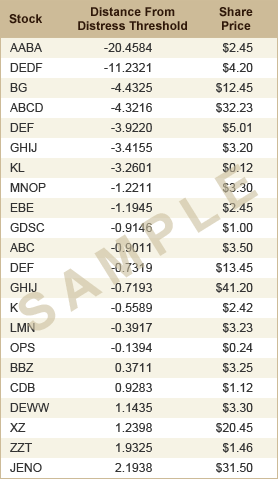Enter a stock symbol
Enter a stock symbol to view that company's Altman Z-Score if it is a manufacturing company, or its Altman Z"-Score, if it is a non-financial, non-manufacturing company, and to view message board posts for that stock (Scores are available for premium members).
Screener
Below is a list of today's twenty-five most distressed stocks (according to their Altman Z-Score or Z''-Score, respectively) with a share price of $5 or higher. For details on how this ranking list is compiled, please click here.



Stock Chart
Flash Player 9 or higher is required to view the chart
Click here to download Flash Player now
SPY - "It's nuts to be net long"
Mike "Mish" Shedlock on his outlook for stocks: http://finance.yahoo.c...=
Submit a comment
In order to comment please sign in.
Also worth checking out Tim Knight's interesting post today, comparing the current head & shoulders pattern in the S&P to the one exhibited by BRCM in 2000: http://slopeofhope.com...
Also worth checking out David Weidner on earnings season ( http://www.marketwatch... ). Excerpt:
Wall Street banks and brokerages are readying second-quarter numbers for mass digestion. They'll show healthy balance sheets, tolerable risk levels and have all the trappings of well-run companies.
Don't believe a word of it.
If the second quarter is anything like quarters of the past couple years, risk is up and capital is down. And what you'll see on earnings day bears little resemblance to the business being conducted between the bookends of the start and end of the latest quarter. After all, Wall Street is an industry built on prevaricating for clients -- Enron Corp., Greece and Parmalat Spa /quotes/comstock/23g!plt (IT:PLT 1.96, +0.04, +1.98%) to name a few -- why would it come clean with its own financials?
Here's an interpretation of Alcoa's earnings that puts things into perspective:
http://seekingalpha.co...
"Congratulations to Alcoa (AA) beating guidance after Bloomberg and Reuters lowered their estimates from $0.17 and $0.15 respectively, to $0.12 only one month prior. Some analysts even went on a limb and estimated as high as $0.19, of course, mainstream media easily erased those headlines. Alcoa (NYSE:AA) reported Q2 EPS of $0.13, topping estimates of $0.12. Revenues grew 22% year-over-year to $5.19 billion, topping estimates of $5.05 billion.
Alcoa Chairman and CEO Klaus Kleinfeld said,
'The top and bottom line growth was driven by higher volumes from stronger end markets and continued gains from our productivity programs. Based on this improved end-market demand, we are raising our projection for aluminum consumption from 10% to 12% this year.'
Wait a minute now, is this the same company who laid off 37,000 employees and is now seeing an increase in demand in all areas of business?
... EPS has been revised down 6 times in the past 30 days and reduced from 23 cents to 12 cents over the past quarter..."
Watch a lot of other companies likewise "beat the street" this quarter with these misleading numbers. Where's the President? We need a speech on the soft bigotry of low expectations.
Tim Knight on "the annoying market" and "the rally from hell": http://slopeofhope.com...
Michael Pento on "The Bull Behind Claims That Stocks Are Cheap" ( http://www.forbes.com/... ). Excerpts:
---------------------------------------------------------------------------------------------------------------------
"A good metric for determining the valuation of stocks is the dividend yield. The current dividend yield on the S&P 500 is a paltry 2.1%, or less than half the historical average of 4.36%. The record-low dividend yield of 1.11% was reached in August 2000. The highest (13.84%) was achieved in June 1932.
On a dividend yield basis, the market appears to be significantly overpriced.
[...]
Household debt and the gross national debt have never been at or above 90% of GDP at the same time--until today. Along with the massive deleveraging that lies ahead for both the public and private sectors, the Treasury must auction off close to $9 trillion in debt each year to cover our ballooning deficits and to satisfy rollovers. This will further crowd out investments that could have been better placed into the stock market.
Once you view the real numbers for P/E ratios and dividend yields, it's hard to argue that stocks are cheap. Given the low cash levels at mutual funds and the crowding out of private investment taking place by the government, the stock market will have a hard time producing a sustainable rally of real significance. "
Late to this, but holy crap. John Hussman's most recent weekly market comment ( http://www.hussmanfund... ). Read the whole thing, but here are a couple of brief excerpts:
----------------------------------------------------------------------------------------------------------------------
On current market valuations:
"First, virtually every assessment that "stocks are cheap" here is based on the ratio of the S&P 500 to year-ahead operating earnings estimates, and often comes with a comparison of the resulting "earnings yield" with the depressed 10-year Treasury yield. What's fascinating about this is that this is the same basis on which analysts deemed stocks to be about 40% undervalued just prior to the 2007 top, following which the market plunged by more than half.
[...]
To properly understand the price-to-forward operating earnings ratio, you have to recognize that operating earnings exclude a whole host of charges - what some observers correctly call "recurring non-recurring" charges. These include large and often quite regular losses that the companies deem, often on the thinnest basis, to be detached from their core business - even if the losses are directly related to their core business. Items like enormous asset writeoffs come to mind."
On the bogosity of share repurchases:
"What's fascinating about this, however, is that shareholders are still ignoring it. They also ignore the large percentage of reported earnings that are actually quietly distributed to corporate insiders through the issuance of stock and options. They blindly accept that "share repurchases" are somehow a pleasant distribution of earnings, whereas the majority of share repurchases are actually made by companies to do nothing more than offset the dilution from stock shares and options granted to insiders. "
On the folly of our "hair of the dog" stimulus:
"If our only response to excess consumption is to pull out all the stops trying to "stimulate" consumption every time it falters; if our only response to reckless lending is to defend the bondholders every time their poor allocation of capital threatens to produce a loss for them, then quite simply, we will destroy our economy, our future, and our standard of living. The last thing I want to be is a cheerleader for the bears here. But quite honestly, it's difficult to envision a return to long-term saving, productive investment, and thoughtful allocation of capital until - as happens every two or three decades - the speculative elements of Wall Street are crushed to powder."